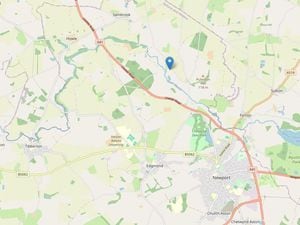26 more coronavirus deaths confirmed in Black Country, Birmingham and Staffordshire hospitals
The death toll in the region's hospitals alone is now just below 2,000.
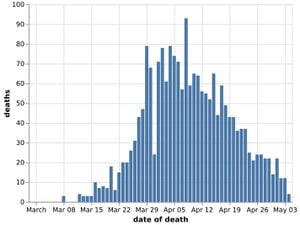
A further 26 coronavirus patients have been confirmed to have died in hospitals in the Black Country, Birmingham and Staffordshire.
Today's announcement means 1,995 patients have died with Covid-19 in the region's hospitals since the pandemic began.
Meanwhile the death toll in English hospitals rose by 366 to 21,750.
The latest UK-wide figures from the Government, which include deaths in care homes and the wider community, show the death toll has increased by 693 to 29,427.
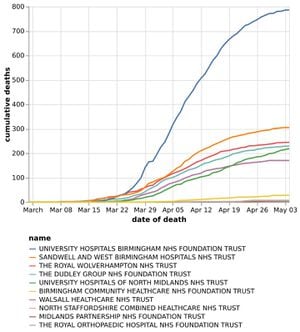
Of the hospital deaths announced today 11 were at the University Hospitals of North Midlands NHS Trust, which runs Stafford's County Hospital and Royal Stoke University Hospital, where 218 patients have now died.
Eight more deaths were confirmed at the University Hospitals Birmingham NHS Foundation Trust where 786 patients have now died. The trust runs Queen Elizabeth Hospital and three other hospitals in Birmingham.
Another three deaths were confirmed at the Dudley Group NHS Foundation Trust, which runs Russells Hall, taking the death toll there to 229.
Two more deaths were announced at the Sandwell and West Birmingham trust which runs Sandwell General and City Hospital, where 305 coronavirus patients have died.
One more death was confirmed at the Royal Wolverhampton NHS Trust, which runs New Cross and Cannock Chase hospitals, making a death toll of 244.
And one more death was confirmed at the Birmingham Community Healthcare NHS Foundation Trust making a new total of 28.
No new deaths were reported in Walsall where the death toll remains at 170. And in Worcestershire four more deaths were confirmed taking the county's hospital death toll to 236.
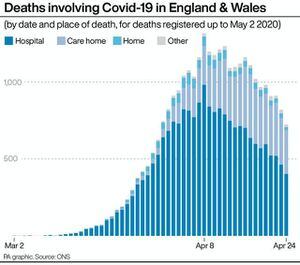
Meanwhile data from the Office for National Statistics (ONS) shows almost as many people died in the region's care homes as died in hospitals in the last week of April.
Nationally the UK has passed Italy as the country with the most Covid-19 deaths in Europe – but academics have warned that cross-country comparisons are “difficult”.
The official number of Covid-19 deaths in Italy stood at 29,079 as of 6pm on May 4, according to the Italian Ministry of Health, while the latest UK figure from the Government is 29,427.
More Covid-19 coverage:
Dr Alasdair Munro and Professor Saul Faust say it is time for classes to re-open as evidence from around the world shows that children have less chance of catching Covid-19 and are not “super-spreaders” of the virus.
In an article published by BMJ Journals online, the pair point out that not only are children less likely than adults to catch Covid-19, they are less likely to spread it.
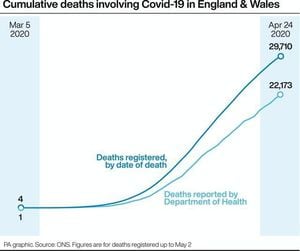
In other news, Health Secretary Matt Hancock has dismissed warnings by civil liberties campaigners that a new coronavirus contact tracing app could open the door to widespread “state surveillance”.
Ministers are urging the public to sign up to the app – which is beginning trials on the Isle of Wight -as a way out of the current lockdown and re-starting the economy.
The Government’s efforts to promote the new “test, track and trace” strategy came as official figures showed the death toll had soared past 30,000 and analysis found at least 140 NHS and care workers have lost their lives.
Ministers have run into opposition from some Tory MPs and campaign groups concerned about the potential for the state to monitor individuals’ movements and contacts through the app.
Mr Hancock however insisted it is “completely wrong” to say that the app represents a threat to civil liberties.




